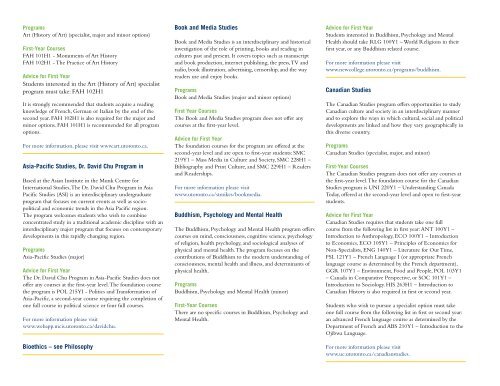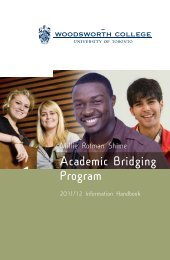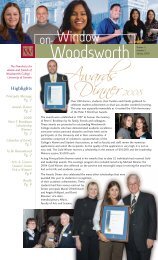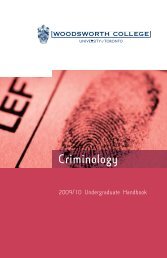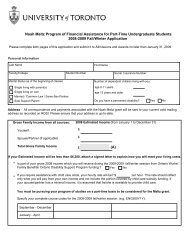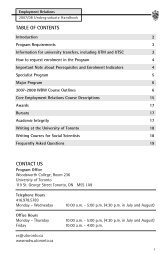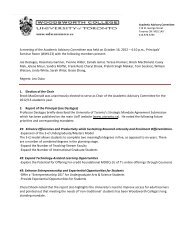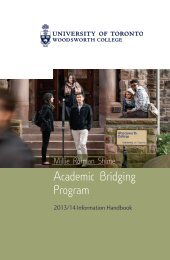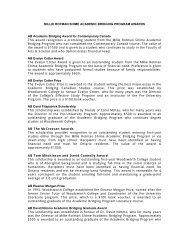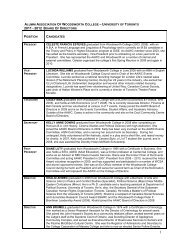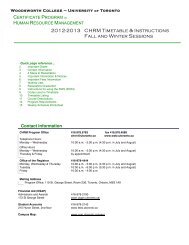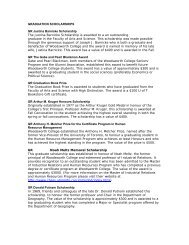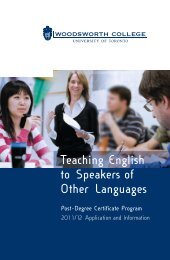First-Year Handbook 2009/10 - Woodsworth College - University of ...
First-Year Handbook 2009/10 - Woodsworth College - University of ...
First-Year Handbook 2009/10 - Woodsworth College - University of ...
Create successful ePaper yourself
Turn your PDF publications into a flip-book with our unique Google optimized e-Paper software.
ProgramsArt (History <strong>of</strong> Art) (specialist, major and minor options)<strong>First</strong>-<strong>Year</strong> CoursesFAH <strong>10</strong>1H1 - Monuments <strong>of</strong> Art HistoryFAH <strong>10</strong>2H1 - The Practice <strong>of</strong> Art HistoryAdvice for <strong>First</strong> <strong>Year</strong>Students interested in the Art (History <strong>of</strong> Art) specialistprogram must take: FAH <strong>10</strong>2H1It is strongly recommended that students acquire a readingknowledge <strong>of</strong> French, German or Italian by the end <strong>of</strong> thesecond year. FAH <strong>10</strong>2H1 is also required for the major andminor options. FAH <strong>10</strong>1H1 is recommended for all programoptions.For more information, please visit www.art.utoronto.ca.Asia-Pacific Studies, Dr. David Chu Program inBased at the Asian Institute in the Munk Centre forInternational Studies, The Dr. David Chu Program in AsiaPacific Studies (ASI) is an interdisciplinary undergraduateprogram that focuses on current events as well as sociopoliticaland economic trends in the Asia Pacific region.The program welcomes students who wish to combineconcentrated study in a traditional academic discipline with aninterdisciplinary major program that focuses on contemporarydevelopments in this rapidly changing region.ProgramsAsia-Pacific Studies (major)Advice for <strong>First</strong> <strong>Year</strong>The Dr. David Chu Program in Asia-Pacific Studies does not<strong>of</strong>fer any courses at the first-year level. The foundation coursethe program is POL 215YI - Politics and Transformation <strong>of</strong>Asia-Pacific, a second-year course requiring the completion <strong>of</strong>one full course in political science or four full courses.For more information please visitwww.webapp.mcis.utoronto.ca/davidchu.Bioethics – see PhilosophyBook and Media StudiesBook and Media Studies is an interdisciplinary and historicalinvestigation <strong>of</strong> the role <strong>of</strong> printing, books and reading incultures past and present. It covers topics such as manuscriptand book production, internet publishing, the press, TV andradio, book illustration, advertising, censorship, and the wayreaders use and enjoy books.ProgramsBook and Media Studies (major and minor options)<strong>First</strong> <strong>Year</strong> CoursesThe Book and Media Studies program does not <strong>of</strong>fer anycourses at the first-year level.Advice for <strong>First</strong> <strong>Year</strong>The foundation courses for the program are <strong>of</strong>fered at thesecond-year level and are open to first-year students: SMC219Y1 – Mass Media in Culture and Society, SMC 228H1 –Bibliography and Print Culture, and SMC 229H1 – Readersand Readerships.For more information please visitwww.utoronto.ca/stmikes/bookmedia.Buddhism, Psychology and Mental HealthThe Buddhism, Psychology and Mental Health program <strong>of</strong>ferscourses on mind, consciousness, cognitive science, psychology<strong>of</strong> religion, health psychology, and sociological analyses <strong>of</strong>physical and mental health. The program focuses on thecontributions <strong>of</strong> Buddhism to the modern understanding <strong>of</strong>consciousness, mental health and illness, and determinants <strong>of</strong>physical health.ProgramsBuddhism, Psychology and Mental Health (minor)<strong>First</strong>-<strong>Year</strong> CoursesThere are no specific courses in Buddhism, Psychology andMental Health.Advice for <strong>First</strong> <strong>Year</strong>Students interested in Buddhism, Psychology and MentalHealth should take RLG <strong>10</strong>0Y1 – World Religions in theirfirst year, or any Buddhism related course.For more information please visitwww.newcollege.utoronto.ca/programs/buddhism.Canadian StudiesThe Canadian Studies program <strong>of</strong>fers opportunities to studyCanadian culture and society in an interdisciplinary mannerand to explore the ways in which cultural, social and politicaldevelopments are linked and how they vary geographically inthis diverse country.ProgramsCanadian Studies (specialist, major, and minor)<strong>First</strong>-<strong>Year</strong> CoursesThe Canadian Studies program does not <strong>of</strong>fer any courses atthe first-year level. The foundation course for the CanadianStudies program is UNI 220Y1 – Understanding CanadaToday, <strong>of</strong>fered at the second-year level and open to first-yearstudents.Advice for <strong>First</strong> <strong>Year</strong>Canadian Studies requires that students take one fullcourse from the following list in first year: ANT <strong>10</strong>0Y1 –Introduction to Anthropology, ECO <strong>10</strong>0Y1 – Introductionto Economics, ECO <strong>10</strong>5Y1 – Principles <strong>of</strong> Economics forNon-Specialists, ENG 140Y1 – Literature for Our Time,FSL 121Y1 – French Language I (or appropriate Frenchlanguage course as determined by the French department),GGR <strong>10</strong>7Y1 – Environment, Food and People, POL <strong>10</strong>3Y1– Canada in Comparative Perspective, or SOC <strong>10</strong>1Y1 –Introduction to Sociology. HIS 263H1 – Introduction toCanadian History is also required in first or second year.Students who wish to pursue a specialist option must takeone full course from the following list in first or second year:an advanced French language course as determined by theDepartment <strong>of</strong> French and ABS 2<strong>10</strong>Y1 – Introduction to theOjibwa Language.For more information please visitwww.uc.utoronto.ca/canadianstudies.


